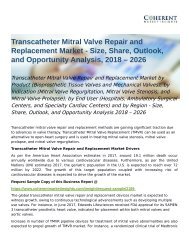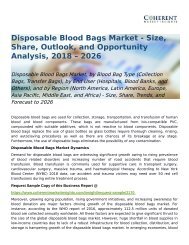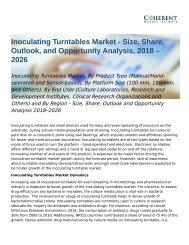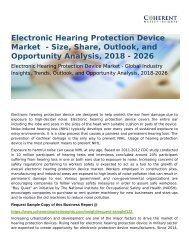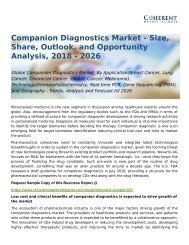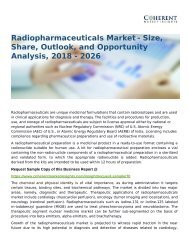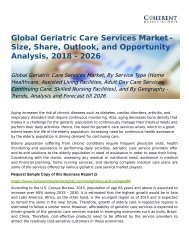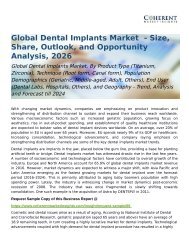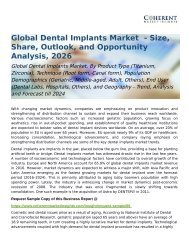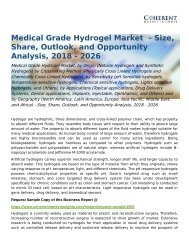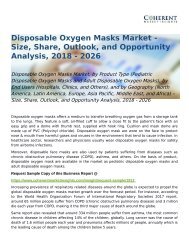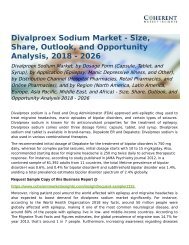Antidiabetic Biosimilars Market - Global Industry Insights, and Opportunity Analysis, 2016-2024
Antidiabetics help control blood glucose levels in diabetic patients. Various types of antidiabetics include biguanides, thiazolidinediones, DPP-IV inhibitors, α-glucosidase Inhibitors, sulfonylureas, insulin, and GLP-1 receptor agonists such as exenatide. A biosimilar product is biological product that is approved on the basis that it is highly similar to a FDA approved biological product known as a reference product. Biosimilar manufacturers need to generate data from lab testing and clinical testing to demonstrate that the biosimilar developed provides the same therapeutic benefit to patients as the reference product.
Antidiabetics help control blood glucose levels in diabetic patients. Various types of antidiabetics include biguanides, thiazolidinediones, DPP-IV inhibitors, α-glucosidase Inhibitors, sulfonylureas, insulin, and GLP-1 receptor agonists such as exenatide. A biosimilar product is biological product that is approved on the basis that it is highly similar to a FDA approved biological product known as a reference product. Biosimilar manufacturers need to generate data from lab testing and clinical testing to demonstrate that the biosimilar developed provides the same therapeutic benefit to patients as the reference product.
Create successful ePaper yourself
Turn your PDF publications into a flip-book with our unique Google optimized e-Paper software.
REPORT DESCRIPTION<br />
<strong>Antidiabetic</strong> <strong>Biosimilars</strong> <strong>Market</strong> – Overview<br />
<strong>Antidiabetic</strong>s help control blood glucose levels in diabetic patients. Various types of antidiabetics include biguanides, thiazolidinediones,<br />
DPP-IV inhibitors, α-glucosidase Inhibitors, sulfonylureas, insulin, <strong>and</strong> GLP-1 receptor agonists such as exenatide. A biosimilar product<br />
is biological product that is approved on the basis that it is highly similar to a FDA approved biological product known as a reference<br />
product. Biosimilar manufacturers need to generate data from lab testing <strong>and</strong> clinical testing to demonstrate that the biosimilar developed<br />
provides the same therapeutic benefit to patients as the reference product.<br />
Patent expiries to drive growth of the global antidiabetic biosimilars market<br />
The global antidiabetic biosimilars market is driven by increasing number of diabetes mellitus patients. According to World Health<br />
Organization (WHO) the number of people suffering from diabetes stood at 422 million in 2014. The global prevalence of diabetes<br />
among adults above 18 years increased to 8.5% in 2014 from 4.7% in 1980. Increasing incidence of lifestyle disorders such as obesity,<br />
increases the risk of diabetes <strong>and</strong> in turn drives growth of the antidiabetic biosimilars market. In June 2014, the European Medicines<br />
Agency authorized the first biosimilar of insulin Glargine, Abasaglar from Eli Lilly <strong>and</strong> Company <strong>and</strong> Boehringer Ingelhim International<br />
Gmbh, for treatment of diabetes mellitus. The biosimilar received U.S. FDA approval in <strong>2016</strong>, which would fuel growth of the<br />
antidiabetic biosimilars market.<br />
Furthermore patent expiry of insulin aspart <strong>and</strong> insulin lispro is projected to propel growth of antidiabetic biosimilars market. Biosimilar<br />
insulin have potential to reduce diabetes treatment costs, increase accessibility of insulin treatment <strong>and</strong> exp<strong>and</strong> the number of insulin<br />
br<strong>and</strong>s.<br />
© Coherent market <strong>Insights</strong>. All Rights Reserved




